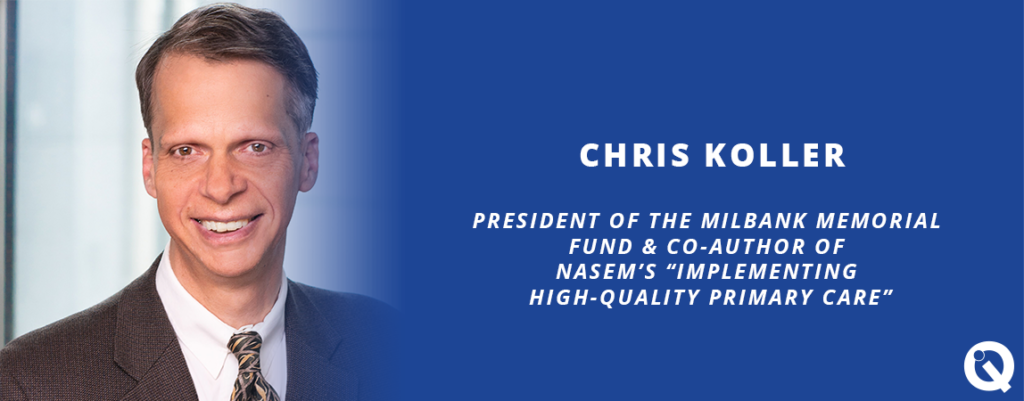Christopher Koller is president of the Milbank Memorial Fund, a 117-year operating foundation that improves population health by connecting leaders with the best information and experience. Before joining the Fund, Koller was Rhode Island’s first health insurance commissioner. Koller was the keynote speaker at the Quality Institute’s recent conference on increasing investment in high quality primary care.
The Milbank Memorial Fund is committed to improving population health. How do you see primary care driving that mission?
There is considerable evidence, some of it published in our journal, The Milbank Quarterly, that primary care-oriented health systems result in improved population health and more equitable health outcomes. And we think both of those are essential to population health. If better overall health and equity is your goal — and that is our goal as a foundation — then you can’t get there without a strong base of primary care. It’s been demonstrated that in the United States we’ve had a markedly weak foundation of primary care. In the U.S., depending on the population, perhaps six percent of every health care dollar goes to primary care. That number is closer to 9 percent in other countries. The priorities reflected in these differences may well contribute to the relatively shorter life expectancy observed in the United States.
As Rhode Island’s health insurance commissioner, how did you make primary care investment a priority in that state?
Unlike other insurance commissioners, in Rhode Island the health insurance commissioner is statutorily required to direct health plans toward policies that improve the affordability of the health care system. Given that, we worked with an advisory committee of consumers, employers, and providers to say, “What are the standards that health plans should be held accountable to in order to improve the affordability of the system?” And when that advisory council looked at national and international evidence, they recognized the benefits of having a strong primary care base and that become one of the standards they encouraged the office to develop. They said, “Let’s make the health plans focus on strengthening primary care.” We thought the simplest way to achieve this was to look at the health plans’ budgets. The budget is the final word.
Can you provide us with some examples of how the Milbank Memorial Fund is advancing primary care?
We are very focused on conversations — like the one we are having in New Jersey — in a number of different states to inspire collective work around increasing the portion of dollars that go to primary care to produce a more primary care-oriented delivery system. And that means reporting on primary care spending, that means speaking to groups, that means getting folks to think about public action. We don’t think that it can happen without public policy that promotes primary care.
We’re also specifically working with Medicaid agencies in some states to think about improving access to primary care for Medicaid beneficiaries. And then, how can they inspire other payers in commercial and Medicare advantage to do the same thing? We’re trying to get states to take a leadership role on primary care through its Medicaid programs.
How do you think a stronger primary care system would have helped us during the pandemic?
We have evidence that we published from Maryland where they’ve been doing a lot of work around integrating public health into primary care, which you can only do if you have an organized primary care system. With Centers for Medicare and Medicaid Services support, Maryland has a statewide primary care program that offers funding, data, and support to participating practices through the state Department of Health. Not all practices participate. That experience shows that primary care practices that participated had lower rates of COVID incidence, lower rates of COVID-related hospitalizations, and lower rates of COVID deaths.
When we interview people, we like to ask something beyond their professional lives. So where might we find you on a day off?
I hope you will find me outdoors doing something with my family: hiking, skiing, those sorts of things. We are fortunate to live in New England where there’s a lot of good outdoor activities and beautiful coastlines. We have adult children, and when they call up and say, “Let’s go outside,” that’s a pleasure.

